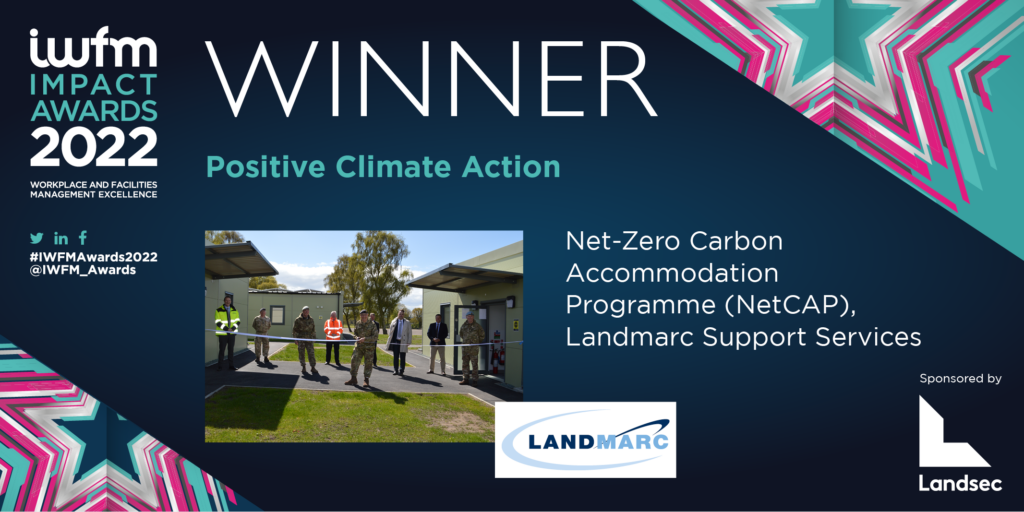Winner: Net-Zero Carbon Accommodation Programme (NetCAP), Landmarc Support Services
Sponsored by: Landsec

Armed forces personnel are benefiting from the first carbon negative accommodation to be delivered across the UK Defence Training Estate (DTE) as part of the government’s Net-zero Carbon Accommodation Programme (NetCAP).
NetCap supports the Ministry of Defence (MoD)’s Climate Change and Sustainability Strategic Approach and its aim that, by 2025, Defence will reduce its built estate emissions by at least 30%. It also took top honours winning the Positive Climate Action Award.
To deliver this programme, the Defence Infrastructure Organisation (DIO) is working with its facilities management partner Landmarc Support Services (Landmarc) and modular construction specialist Reds10 as an integrated project team.
The aim of NetCAP is to transform the lived experience for training troops while supporting the Ministry of Defence (MoD) with its carbon emission goals.
Phase one of the project began in January 2020 and was completed in a little over 18 months, delivering 45 carbon efficient buildings across five camps and providing more than 2,000 bed spaces.
Results gleaned
The programme provided 400 jobs, 150 of which were new and many of which were carried out by SMEs and self-employed contractors local to each site. Using an end-to-end UK supply chain has also meant all of the project’s investment taking place entirely within the UK.
In the project’s first phase, the new buildings represent the DTE’s first carbon negative accommodation with the first building achieving an Energy Performance Certificate (EPC) rating of -5. This has been followed by further blocks achieving EPC ratings of -7, -9 and -10. All scope 1 emissions have been eliminated from these facilities, while Scope 2 emissions have been reduced significantly. Scope 3 emissions have been addressed through savings made in time spent on manufacture and installation, from 15 weeks for the programme prototype to less than 13 weeks for subsequent buildings, meaning reduced waste and vehicle movements.
Additional investment is now seeing a further 29 builds delivered in FY 2022/2023, meaning more than 3,900 new bed spaces across the DTE. New installations include the Training Estate’s first double-storey carbon negative buildings and the introduction of other green measures such as rainwater harvesting.
Best practice learning point
By harmonising programme delivery teams with customer and specialist contractors, Landmarc Support Services has been able to remodel key strategic locations on the training estate to show how it can be transformed to be fit for the twenty-first century and to subsequently secure the investment required to make the estate a better fit for troops and training.
Key quotes
‘When you look at these buildings, our soldiers will say ‘the military are investing in me and it’s worth staying’. I’m really excited that we’re starting to develop – with not a huge amount of money – a completely new training estate in order to be able to deliver better training and therefore better capability for our soldiers, sailors and air personnel.’ – Lt Gen Richard Nugee, MOD Climate Change and Sustainability Lead
‘This investment in modern, carbon efficient accommodation will completely transform the Training Estate, making it a more sustainable place to live, work and train for our Armed Forces.’ – Landmarc Support Services
